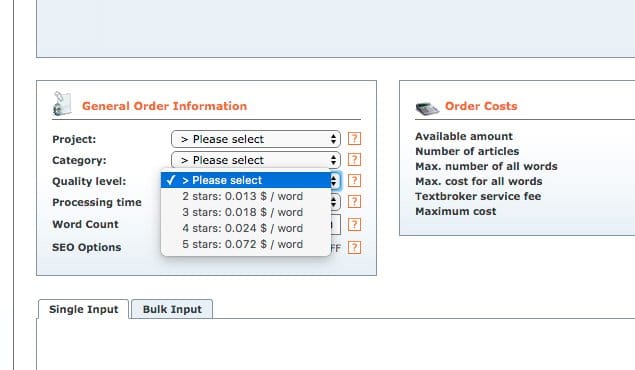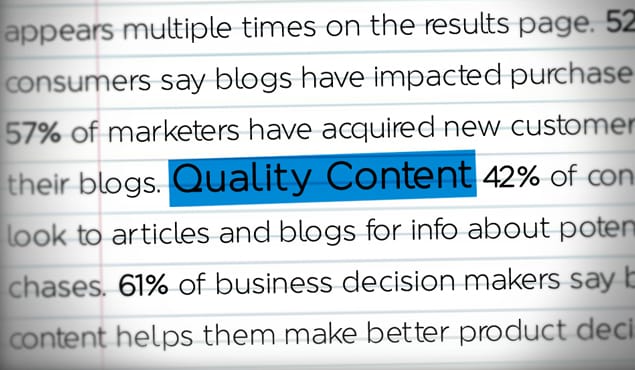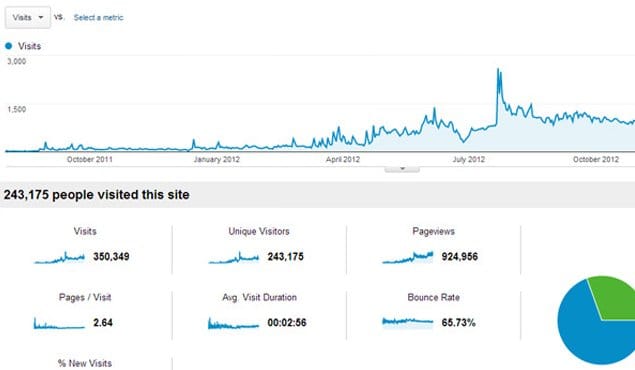Often, when you’re blogging, you come across a choice; do you want to write a post for your own site, or do you want to write one as a guest post for another site? There are pros and cons to both.
I’m assuming, of course, that you have a limited amount of time and effort in which to create new posts. The ideal answer would be “yes”, to write both of them, and move on to more important decisions.
Time Investment
The first concern you might have is that of time. The time investment for blog posts on your own site is probably about comparable to the time investment involved in creating a guest post, but it’s hard to see that, because you probably already have a process in place for your own posts.
For example, with a blog post for your own site, you need to do your keyword research, come up with a topic, research what already exists on that topic, create an outline, find sources, write the actual post, edit and revise the post, and find where in the editorial calendar it will be. Of course, you probably already have slots picked out in your calendar, you have a document full of keyword research already done, and you’re practiced at creating posts for your own site.
Meanwhile, for a guest post, you have to do fresh research on topics and write a pitch, get in contact with an editor and get your pitch approved, do your research and writing, editing and revising for the post, submit it, and edit it again if the editor in question wants revisions. It’s about the same amount of work, but it’s not work you have done in advance, and there’s the unknown factor of the site editor throwing a potential wrench into the works.
In this case, though, I would give the edge to an on-site post rather than a guest post. Posts for your own site have the advantage of being more controlled, you might have ideas already in the works, you have plenty of resources built up for creating your posts, and you don’t have to worry about an external editor rejecting your post.
Verdict: blog post 1, guest post 0.
Monetary Investment
A monetary investment can come into play in a few different ways. Primarily, it matters when you’re paying for a freelance writer to ghostwrite your content for you. You might place a premium on a high quality guest post that you wouldn’t normally pay for a post for your own blog. This makes guest posts potentially much more expensive.
You also have the potential monetary investment involved in some less-than-savory guest posting practices. Paying for a guest post slot is not technically kosher as far as Google is concerned, though it’s often hard to identify and you might not be penalized for doing it, beyond the part where you have to pay your fee.
Then you have the potential cost of access to certain materials you might need for citing sources. If you’re writing something highly authoritative, using academic research, you might need to pay to access online versions of academic journals or other data sources. Not many bloggers do this, and it applies equally to both guest posts and on-site blog posts, so there’s no real winner or loser in this exchange.
Overall, guest posts tend to be more expensive, though if you aren’t paying for a writer, for sources, or for guest posting slots, the cost for both of them is technically zero. You can factor in the time it takes you to write a post and figure out your per-hour rate based on your salary, but that’s going to vary from post to post and from source to source.
Verdict: blog post 2, guest post 0.
Quality Levels
Now, in an ideal world, the quality of every blog post you create will be top notch. However, I know firsthand that sometimes you kind of just phone it in, and sometimes you want to dedicate extra time and attention to a post to make sure it’s pure flagship content.
With posts on your own site, you’re more likely able to phone one in. After all, you could be posting once a week, or twice a week, or five times a week, and not all of those posts are going to be winners. Some of them won’t get traffic because of competition. Some of them just won’t take off for some inexplicable reason, maybe the alignment of the stars. Some of them might get some minor circulation, and others might go viral and take off big time. The thing is, there’s virtually no correlation between the traffic of a post and the quality of that post. I’ve had posts I frankly thought I was phoning in get a lot of traffic, and some I spent a lot of time on get virtually no attention.
On the other hand, with guest posts, you always want to make sure it’s your best foot forward. You don’t want to submit some kind of sub-par content to the people allowing you to guest post on their site, right? It makes a poor impression of your brand and your product. While the quality will vary, the floor for a guest post is much higher than the floor for a post on your own blog, generally simply due to complacency.
While this means your guest posts are going to be higher quality, that is again no guarantee of the value they bring in. If you can spend the effort you would to create one guest post on creating two blog posts for your own site, those two posts might be more valuable than the one single guest post. Or they might not! To that end, I give this one a tie; no points awarded. The quality level of a post should always meet the minimum usability and readability standards of modern web content, and going above and beyond isn’t necessarily better.
Verdict: blog post 2, guest post 0.
Traffic Potential
The traffic potential of a blog post is hard to measure, because with the way posts can go viral for basically no reason, the technical ceiling is nearly infinite. However, if you ignore the possibility of going viral, you can make some estimates and figure out what sort of traffic each post can bring in.
For a blog post, you need look no further than your own analytics. Look at your last week or two and see how much traffic each post you publish gets, on average. That, right there, is about the kind of traffic you can expect with a new post. That new post might be able to pull in more if it’s particularly catchy, or if you put it through extra promotion, but that’s a good baseline.
For a guest post, you have to look a little harder, and you don’t really have access to find empirical data. However, it’s reasonable to say that a guest post doesn’t exist for the traffic. Guest posts have their value in branding, in name recognition, in link building, and in the relationships you form with the influencers who post on the target site. If you want a more in-depth breakdown of traffic you can expect to get from a guest post, I wrote an article about it here.
So, consider that you’re not likely to get a significant amount of traffic from a guest post. This means that the traffic value winner depends on the average traffic of your normal blog posts. Ideally it will be high enough to outweigh the guest post, so I’m going to assume you’re getting more than 200-400 hits per post.
Verdict: blog post 3, guest post 0
Link Value
Now comes the opposite side of the coin; the value of the link. The primary value of a guest post is that you get a link back to your site, you get your name out there, and you get name recognition from the readers of this other high profile site you’re posting on. All of this is excellent for SEO, for user trust, and for eventual traffic. A guest post has a lot of power, and a sustained campaign of guest posts has the ability to double or triple your traffic year over year, at least up to a certain point.
Compared to this, a blog post on your own site is by default not going to be a valid backlink. While internal links are valuable and you should strive to include them, they aren’t the boosters you want to get out of a guest post. They don’t add to your backlink profile on their own.
This is first-degree link value, however. The link from the post itself heavily favors the guest post so much so that I’m giving guest posting a point just for that. You do, however, also have second-degree links to consider. Second-degree links are people who link to your post because of its content, not because you have an arrangement like a guest posting arrangement.
As far as guest posts are concerned, you get some value from second-degree links, but not a ton. Anyone linking to your guest post is giving the host site the value. The value you get comes from the fact that the host site gains value and thus has more to pass on to you.
For on-site blog posts, every second-degree link is a valuable backlink to your site, not filtered through another site. Are you going to get any of those links, though? That depends on the traffic, popularity, quality, and viral appearance of the post. Some posts will get a lot of links, others won’t get any. It’s too inconsistent to really give a point to blog posts for it.
Verdict: blog post 3, guest post 1.
Additional Work and Value
This next category is the nebulous concept of the additional work you put in beyond simply creating and publishing the post, and the value you get from it. This is your social media circulation, your outreach via comments or social groups, your links from influencers, and other forms of inbound marketing.
You probably have your own basic promotion cycle for every post you write, that involves a simple share on social media, addition to your newsletter, and not much else. For higher tier or extremely pushed posts, you have additional outreach, group posts, and other options. You also have measurable results for this outreach.
For a guest post, you can run it through your pushed post outreach for much the same value… to the host site. Again, they’re the ones that get the links and traffic, you just get some runoff. However, you also benefit from their promotion cycle, their mailing list, their exposure, and all the rest. This is access you don’t normally get, and value you’re getting for free.
You do still want to run guest posts through your promotion cycle, even if their site is the one that benefits from it, because you want your guest posts to stand out as excellent content on their site. When they do, you benefit through increased willingness to have you back for future promotion, and the chances that the influencers on that site will link to you on it.
Verdict: blog post 3, guest post 2.
Value Over Time
The final section here is value over time. As you’ve probably measured, the value of a blog post is generally a spike in traffic followed by a return to baseline after a day or two. Some content might last longer, but what you’re really after is the evergreen content that increases the baseline. Guest posts don’t do that. However, guest posts very much do increase your baseline over time due to a robust backlink profile. Both types of post have the same effect, through different channels.
Verdict: blog post 4, guest post 3.
As you can see, both types of post come out about even. Posting on your own site technically comes out ahead, but the way I see it, you should never have to choose. Aim for 1-2 guest posts per month, with a variety of different sites, and see how they do. Meanwhile, keep up a consistent schedule of posts on your blog, and grow that baseline over time. Combined, they’re exceptionally powerful.
 ContentPowered.com
ContentPowered.com









